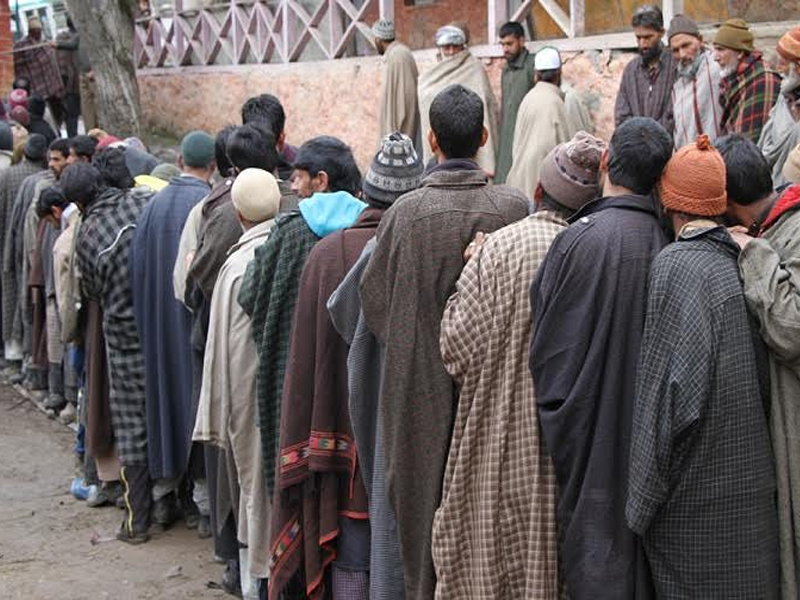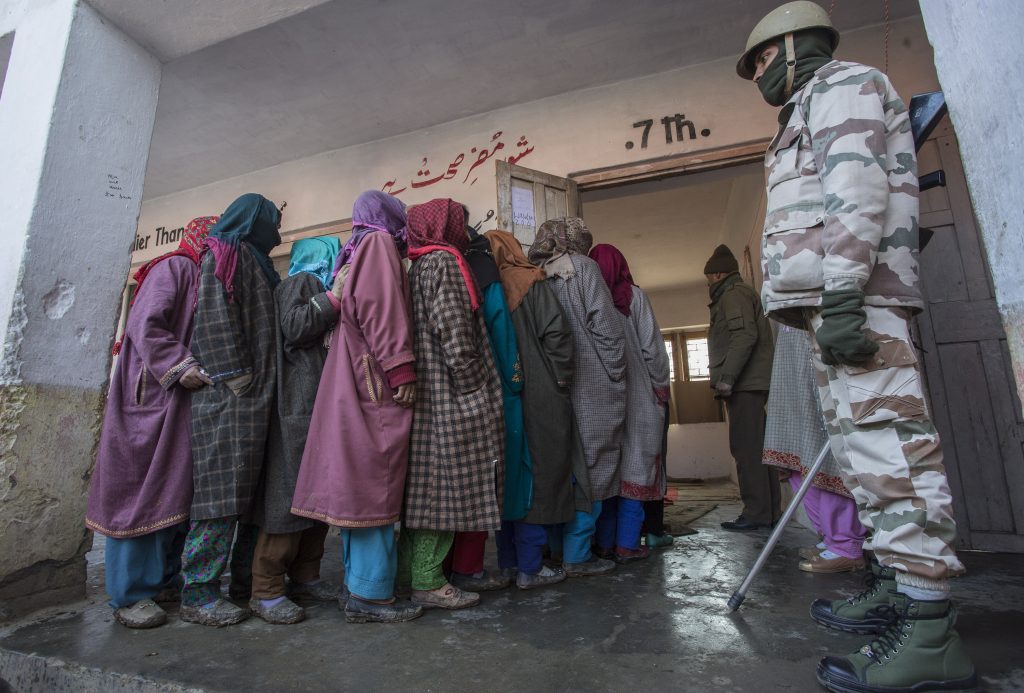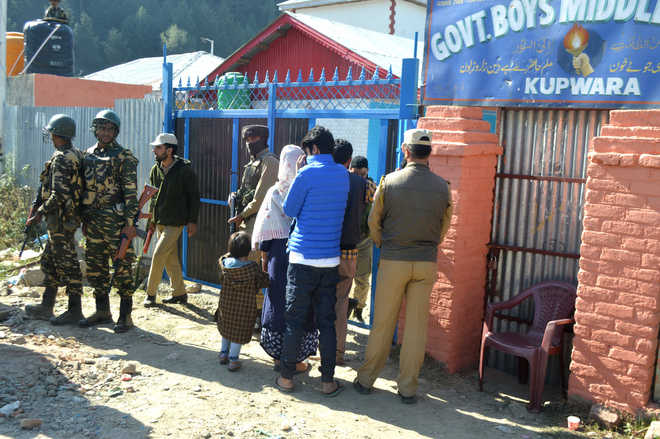It might sound confusing to many, but in reality, it is a pretty simple and straightforward matter.
On November 14, Kashmir (both sides of the LoC) woke up to the rather perplexing news of two women born in PaK winning Panchayat elections in north Kashmir’s Kupwara district. The news went viral and made headlines in both local and national media. And for good reasons: in the three decades of the Kashmir conflict, a person from the other side of the border contested and won local elections. More importantly, both the women were elected unopposed. Dilshada won from a halka Pringroo, Handwara Town while Arifa won from Khumriyal area of the Kupwara district. And Arifa won on a BJP seat.

People waiting to cast their vote – representational pic
‘A Kashmiri from the other side is still an Indian citizen’
As per the definition of State Subjects as provided under Notification of 28th April, 1927 (Legal Document No. 44) issued by the Maharaja of then princely state of J&K (including that part which is now under administration of Pakistan) the residents of Pakistan Administered Kashmir (PaK) are the State Subjects of J&K.
Shafqat Nazir, a senior lawyer from Jammu and Kashmir High Court, explains: “Nothing stops them from contesting elections in J&K. Further, under section 6(2) of the Constitution of J&K, those permanent residents who, before the 14th day of May, 1954 were the state Subjects but migrated to the territory now included in Pakistan, return and apply for grant of Permanent Resident Status under law and rules can also become the Permanent Resident of State.”
“One may have a difference of opinion regarding whether one should participate in Panchayat elections under present circumstances or not, but that is a political issue and not a legal issue,” he added.
Advocate G.N. Shaheen concurred with Adv Nazir. “They (people from PaK) are legally state subjects of Jammu and Kashmir…one doesn’t lose state subject rights due to the ceasefire line. They are entitled and have every right to contest elections,” said Nazir, adding “people living in that part of Kashmir (PaK) have state subject rights in this part of Kashmir (IaK), similarly we too have state subject rights there in PaK.” Shaheen gave the example of the wife of separatist leader Yousuf Naseem whose wife is an elected legislator in the PaK assembly.
From Muzaffarabad to Kupwara via Nepal
The roots of this story lie in the 1990s, when militancy was at its peak in Kashmir. Like thousands of youth, Mohammad Yousuf Bhat, then a teenager, crossed the LoC in 1999. He joined Hizb-ul-Mujahideen for three years before leaving militancy to set up his own business in Muzaffarabad, PaK. There, he married Dilshada Begum in 2002 and was living an “honourable life”. When Jammu and Kashmir government announced a rehabilitation policy for returning of ex-militants, it was a moment of “joy” for Yousuf, he told TwoCircles.net.
“I told my wife that we will go back to Kashmir as the government has made a special policy for us”, says Yousuf, adding that they didn’t have enough money for the air tickets. “My family members arranged some money for tickets and I sold my business in Muzaffarabad,” he says. “We drove to Rawalpindi where we boarded a plane to Karachi. From Karachi we flew to Nepal, and from there we reached New Delhi finally,” he says.
The couple along with the kids got Aadhar and ration card in 2015 but are facing a difficult times due to government’s ‘failed rehabilitation policy’, says Yousuf.
It is important, however, to point that the run up to these elections was marred by violence and threats from militant groups who warned of serious consequences to anyone who contested in the process. As a result, a number of people did not take part in the elections and such is the fear that even when this correspondent reached Kupwara, both candidates refused to meet him in person and instead chose to speak over phone. When asked about the threat of the militants, Dilshada says, “We don’t have any option. If they want to kill us, it’s their will but we are living in terrible conditions, for God sake, tell us where should we go? Neither can we go to Pakistan nor we are being allowed to live here peacefully…we have to take this kind of risks in order to live here.” Mawar, Handwara, the village in which they live is a remote area and has been neglected by all the governments. In order to change the “fate of its inhabitants,” Dilshada decided to contest elections, she says.
She also said there are around a dozen Pakistani women who have come as spouses of ex-militants in her district. They find it difficult to get their name on ration cards, election cards, and other essential documents. “We aren’t allowed to return Pakistan to see our relatives, so I thought I will also fight for them, she says.

panchayat election pic used for representational purposes
A few kilometres from Mawar village is the Khumriyal area in the same district, from where Arifa Begum has won on a BJP ticket. She too came to this part of Kashmir along with her husband Ghulam Mohammad Mir via Nepal. Mir crossed the Line of Control (LoC) in 2001 and remained in PaK till 2010. He got married to Arifa, originally a resident of Palandari village in Muzaffarabad and came back in 2010. Arifa had submitted nomination papers for both Panch as well as Sarpanch wards in Khumriyal-B in the frontier district.
There were no nominations against her and as such she has been declared elected unopposed for both Panch and Sarpanch wards, an official from the district administration said.
What is interesting is that Arifa was on a BJP ticket. When we asked Altaf Thakur, spokesman of the BJP unit of Kashmir as to how the party nominated a Pakistan-born girl in Panchayat elections in Kashmir, he defended the move. “First of all, she isn’t from Pakistan, but Pakistan-Occupied Kashmir and it is a part of India. We have no issues if someone from PoK came here and contested election; in fact our legislative assembly has 25 seats reserved from them,” adding, “Aarifa has married a Kashmiri and now she is the citizen of India. It is a welcome step,” he said.
According to reports, nearly 450 families of former militants came to Kashmir Via Nepal route. However, they are facing a relentless struggle to make both ends meet in the absence of a proper rehabilitation policy.
Courtesy: Two Circles
